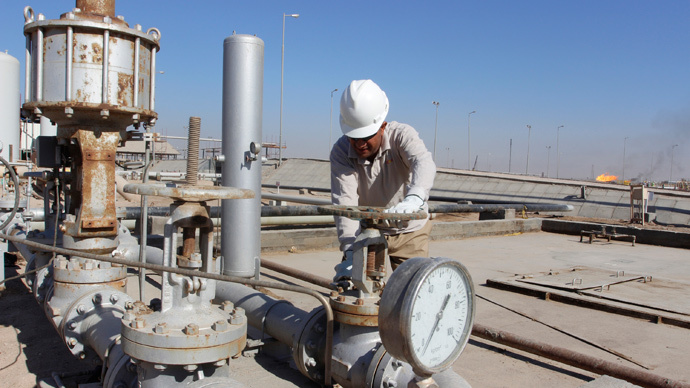Iraq to increase oil export to new record high, price war intensifies - media

Iraq is ready to increase its crude exports to a record 3.75 million barrels per day in June, continuing OPEC’s strategy of ousting US shale producers from the market.
The extra oil from Iraq comes to about 800,000 barrels per day, more than from another OPEC member, Qatar, said Bloomberg, referring to Iraq's oil shipments schedule.
OPEC countries are increasing crude output to protect their market share and decrease oil prices, in an attempt to divert investors from expensive oil, including US shale, heavy oils and deep offshore.
OPEC nations are scheduled to meet on June 5 and are expected to confirm current output levels - about 30 million barrels per day. Thirty-three out of 34 analysts and traders surveyed by Bloomberg agreed that OPEC will maintain its daily production.
READ MORE: Saudi Arabia claims success in tussle for oil market share
Officials from OPEC countries have already said the oil output is unlikely to be cut in the nearest future.
"Lowering OPEC's production ceiling requires consensus between all members ... under current conditions it seems unlikely that the OPEC production ceiling will change," said Iran's Oil Minister Bijan Zanganeh on Sunday.
Iraq is increasing oil exports in two directions. The first is in the Shiite south, where companies such as BP and Royal Dutch Shell work. The second is Nothern Iraqi Kurdistan, whose government last year received Baghdad's consent to independent oil deliveries.
In April, Iraq exported almost 3.1 million barrels of oil per day, which is a record.
Forget #OPEC as a whole, the two countries to watch are #Iraq and #Iran as #oil output rises pic.twitter.com/ZphwyVMJqb
— Javier Blas (@JavierBlas2) May 27, 2015
The same month, Saudi Arabia increased crude output by 13,700 barrels per day to 10.308 million, reporting its highest oil production in more than three decades.
Many non-OPEC players in the region are dissatisfied with the situation on the market, which is flooded with cheap oil.
Oil prices dropped by about 50 percent in the second half of 2014, but have gone up to $60-65 per barrel since the beginning of 2015.
The current situation on the oil market and the price is not sustainable for Oman, said the country’s Oil and Gas Minister Mohammed Rumhy, adding that his country is ready to unilaterally cut oil output.Oman is the biggest Middle Eastern oil producer outside Saudi-led OPEC,
At the last OPEC meeting in November, the organization decidednot to cut production despite falling prices and a major oversupply.












